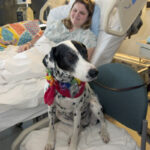Can Dogs Eat Frozen Yogurt
Cold and creamy, frozen yogurt is a popular treat for humans on hot summer days. But what about dogs? Can they enjoy this frozen dessert too? While some types of yogurt can be healthy for dogs in moderation, not all frozen yogurts are created equal. In this article, we will explore the benefits and risks of feeding frozen yogurt to dogs, as well as some tips for choosing the right kind and serving size.
What is Frozen Yogurt?
Frozen yogurt is a frozen dessert made from yogurt, milk, sugar, and other ingredients such as fruit, nuts, or flavorings. It is similar to ice cream but typically contains less fat and calories. Frozen yogurt can be eaten by itself or mixed with toppings like sprinkles or syrups. Some people also use it as a base for smoothies or shakes.
Can Dogs Eat Frozen Yogurt?
Yes, dogs can eat frozen yogurt in moderation as long as it does not contain any harmful ingredients. Yogurt contains beneficial bacteria called probiotics that can aid digestion and boost immunity in both humans and dogs. Probiotics can help regulate the gut flora and reduce inflammation caused by allergies or infections.
However, not all yogurts are safe for dogs to eat. Some yogurts may contain artificial sweeteners like xylitol that can cause hypoglycemia (low blood sugar) and liver failure in dogs. Other yogurts may have high levels of sugar or fat that can lead to obesity, dental problems, or pancreatitis (inflammation of the pancreas).
When choosing a frozen yogurt for your dog, look for one that is plain or lightly flavored with natural ingredients like fruit or honey. Avoid yogurts that contain chocolate, caffeine, alcohol, nuts, raisins, grapes, onions, garlic, chives, or any other foods that are toxic to dogs. Check the label for the amount of sugar and fat per serving and choose a low-fat, low-sugar option if possible.
How Much Frozen Yogurt Can Dogs Eat?
The amount of frozen yogurt that dogs can eat depends on their size, age, health, and activity level. As a general guideline, treats should not exceed 10% of a dog’s daily calorie intake. For example, a medium-sized dog that needs 1000 calories per day should not consume more than 100 calories from treats or table scraps. One cup of vanilla frozen yogurt contains about 200 calories, so you should give your dog no more than half a cup or less depending on its weight and other factors.
It is also important to introduce new foods gradually and observe your dog’s reaction. Some dogs may be lactose intolerant or have allergies to dairy products, which can cause diarrhea, vomiting, or skin irritation. If you notice any adverse effects after feeding your dog frozen yogurt, stop immediately and consult your veterinarian.
Benefits of Feeding Frozen Yogurt to Dogs
Feeding frozen yogurt to dogs can have several benefits besides the pleasure of eating something cold and tasty. Some of the benefits include:
– Probiotics: As mentioned earlier, yogurt contains beneficial bacteria that can help maintain a healthy gut flora in dogs.
– Calcium: Yogurt is a good source of calcium which is essential for strong bones and teeth in dogs.
– Protein: Yogurt contains protein which is important for muscle growth and repair in dogs.
– Hydration: Frozen yogurt can provide some hydration for dogs who may not drink enough water especially during hot weather or after exercising.
– Mental stimulation: Giving your dog a treat like frozen yogurt can provide mental stimulation and prevent boredom which can lead to destructive behavior.
– Bonding: Sharing food with your dog can strengthen the bond between you and your pet.
Risks of Feeding Frozen Yogurt to Dogs
Feeding frozen yogurt to dogs also involves some risks that should not be ignored. Some of the risks include:
– Obesity: If your dog eats too much frozen yogurt or other treats, it may gain weight and become overweight or obese which can lead to various health problems such as diabetes, heart disease, or joint pain.
– Dental problems: Frozen yogurt contains sugar which can contribute to dental plaque and tartar buildup in dogs if not brushed regularly. Chewing on frozen treats can also cause teeth fractures or injuries in some dogs.
– Digestive upset: Dogs who are lactose intolerant or have sensitive stomachs may experience digestive upset such as diarrhea, bloating, or gas after eating frozen yogurt. Too much dairy intake can also lead to pancreatitis which is a painful and potentially life-threatening condition.
– Allergic reactions: Some dogs may have allergic reactions to ingredients in frozen yogurt such as fruit, nuts, or honey. Symptoms of allergic reactions may include itching, swelling, hives, or difficulty breathing.
Tips for Feeding Frozen Yogurt to Dogs
If you decide to feed frozen yogurt to your dog, here are some tips to keep in mind:
– Choose plain or lightly flavored yogurts with natural ingredients and low sugar and fat content.
– Do not add any toppings that are toxic or high in calories such as chocolate chips or whipped cream.
– Serve small portions of frozen yogurt as a treat rather than a meal replacement.
– Watch your dog while eating and remove any uneaten portion after a few minutes to prevent spoilage and bacterial growth.
– Offer plenty of fresh water before and after feeding frozen yogurt to help digestion and prevent dehydration.
– Store leftover yogurt in an airtight container in the freezer for up to two weeks.
Conclusion
In conclusion, dogs can eat frozen yogurt but only under certain conditions. The type of yogurt, amount of serving size, and frequency of feeding should be carefully considered based on your dog’s individual needs and preferences. Frozen yogurt can be a healthy and refreshing treat for dogs when chosen wisely and given in moderation. However, it is important to be aware of the risks and benefits of feeding frozen yogurt to dogs and to consult your veterinarian if you have any concerns or questions. Remember, a happy and healthy dog is a well-fed and well-loved dog!



